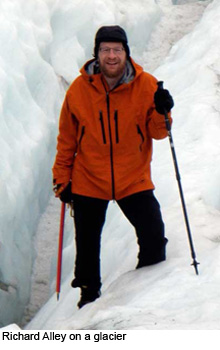6 A&S Physicists Awarded Breakthrough Prize
Our universe is dominated by matter and contains hardly any antimatter, a notion which still perplexes top scientists researching at CERN’s Large Hadron Collider. The Big Bang created equal amounts of matter and antimatter, but now nearly everything—solid, liquid, gas or plasma—is…


 Richard B. Alley, internationally renowned expert on climate and renewable energy, will present the 2012
Richard B. Alley, internationally renowned expert on climate and renewable energy, will present the 2012